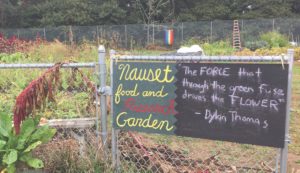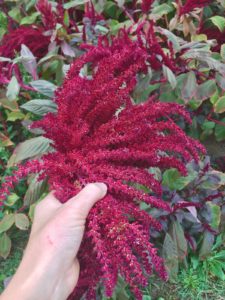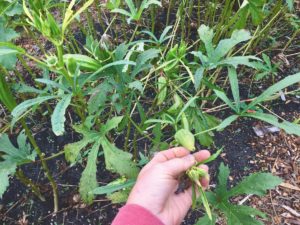EASTHAM — Restoration Agriculture author Mark Shepard of Wisconsin visited the Nauset Food and Research Garden at Nauset Regional High School last week to speak with about two dozen community members on agroforestry.

Shepard is well known in permaculture circles for his pioneering vision of perennial agriculture and advocates using trees to grow staple crops rather than annual plants.
“Our food is the primary cause of ecological destruction,” Shepard told the audience. “We take full complete living ecosystems where all of our needs could be met, destroy them, wash the soil out to sea, and then do it again the next year.”
In the early 1990s Shepard began studying how to grow food to restore ecosystems instead of destroying them. Inspired by the book Tree Crops by J. Russell Smith, he purchased 110 acres of former cornfield in Wisconsin and converted them to a perennial farm where he mimics the layers of a natural ecosystem, but with plants selected for food production.
“Start by identifying the biome of the region where you’re growing,” Shepard explained. (Cape Cod is dominated by scrub oak shrubland.) “The oak is coloring everything, so it’s got to be compatible with oak or it won’t grow well.” The Fagaceae family includes oak, chestnut, and beech trees, all of which produce large edible nuts. Species that are compatible with these trees and that can be grown in lower layers of a Fagaceae-dominated food forest include apples, hazelnuts, plums, cherries, peaches, raspberries, blackberries, grapes, currants, and many species of edible fungi.

The event was sponsored by the Orleans Farmers Market and the Food Forest Initiative of Cape Cod, which co-manage the Nauset Food and Research Garden located at the high school.
“I met Mark at a permaculture workshop in Colorado in 1992,” said Food Forest Initiative member Rand Burkert. “We were both reading Smith’s book on tree crops, and I got involved with starting his farm in Wisconsin.”
Burkert organized Shepard’s talk at the garden as well as a meeting between the author and environmental studies students at Sturgis West in Barnstable and a workshop on the grounds of the Harwich Water Dept. to examine a public right of way under the power lines for restorative agriculture design.
Burkert helped garden founder Gretel Norgeot reinvigorate the plot at the high school after it sat fallow for two seasons, and it reopened this year with a new mission.
“I want the garden to reflect different approaches to growing food, to be a laboratory for ideas, and a place for getting hands on sustainability and ecology experience in high school,” Burkert said. “I’m currently working on writing some small grants to try to get worm composting and chickens into the space, so that we can start to process food scraps and build soil fertility.”
Burkert is also in the process of starting a student garden club and plans to add a small outdoor library with books like Shepard’s Restoration Agriculture and other permaculture titles.

Norgeot said she was inspired by Shepard’s talk and was excited to see several students and a home-schooling family that have been heavily involved with the garden in the audience.
“I respect what people did a couple weeks ago for the climate crisis, taking to the streets,” Shepard told attendees in closing. “But that doesn’t cut it. We need to make real changes and solve real problems for real people, and we need to do it yesterday. Let’s go to the clear cuts, the abandoned farms, and let’s plant it all with food. Let’s transform this world using its own playbook, using the species and processes it’s used forever.”
